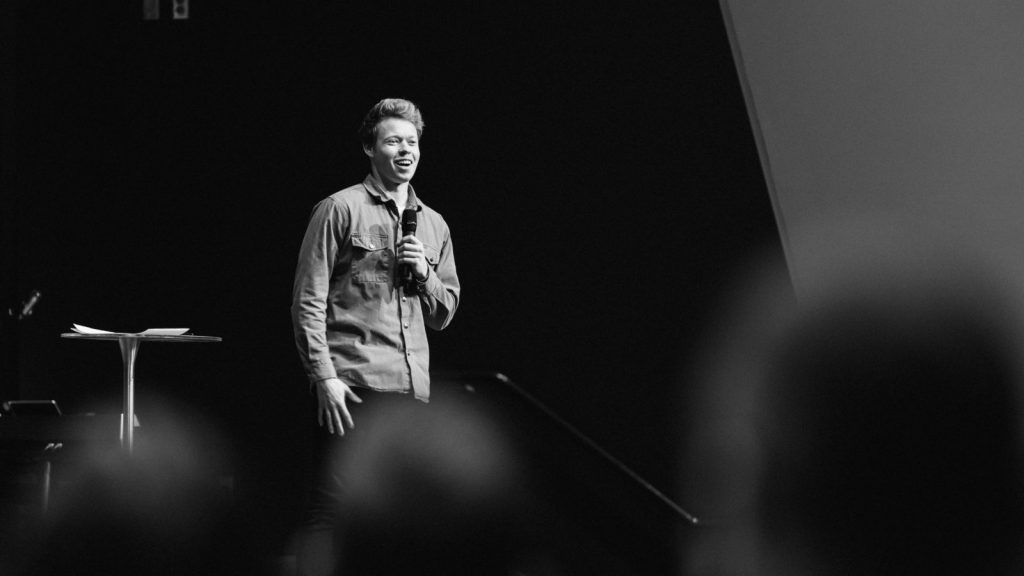In the midst of addiction, our hope for freedom can be clouded by a loss of control, depression, and isolation. From personal experience, the light at the end of the tunnel becomes more and more dim as failure and shame build. While trapped in my addiction to pornography, I thought for years that freedom was unattainable.
My pride and desire for control lead me to think that I could fix myself. The harsh reality was that I couldn’t. But I sit here today, in this moment, with a new level of health and freedom. How did I finally get here?
“Freedom is not having the ability to do what you want to do, freedom is having the ability to do what you ought to do.” – Josh McDowell
Identifying Freedom
First of all, let’s define “freedom,” specific to addiction. About a year and a half ago, when asked to define freedom by a few of the staff here at Josh McDowell Ministry, I thought a moment and replied, “Freedom is not struggling with temptation or sin.”
At the time, I really thought that was the goal I was supposed to be aiming for. It was certainly my personal goal in the first few months of my recovery. But I have come to realize that it’s not the right goal or definition, because it’s completely unrealistic.
Back then I expected that there would be a moment in my recovery where I would experience complete freedom — which would last the rest of my life. I thought freedom meant I would no longer struggle with lust, experience the temptation of sexual sin, or have to deal with the consequences of my sin. Now I understand that complete freedom isn’t possible here on earth, because of our inherent sinful nature. We still sin.
Justification
From my mindset of not struggling, I defined freedom through the lens of justification. Justification is a big theological term that means “to be declared righteous, or to be made right with God.”
Romans 5:18-19 tells us what Christ did for us: “Therefore, as one trespass led to condemnation for all men, so one act of righteousness leads to justification and life for fall men. For as by the one man’s disobedience the many were made sinners, so by the one man’s obedience the many will be made righteous.”
When Christ died on the cross, He took our sins upon himself. In His resurrection, He conquered that sin. Because of His gift of grace, we believers are justified, or declared righteous, when we surrender our lives to Him. Christ paid the price that we could never pay; we are fully forgiven, if we choose to accept it.
Sanctification
I think a much better definition of freedom is found in terms of sanctification. To be sanctified is “to be brought into the presence of God and to share in the life of His Son through the Holy Spirit.” That sounds intimidating, so let me break it down.
You and I have been brought into God’s presence by Christ’s death and resurrection on the cross. This is called adoption. With this adoption, we gain the gift of the Holy Spirit working in our lives. The Holy Spirit helps us in many ways, including convicting us and leading us toward repentance. When we repent and turn away from our sin, we become more like Christ. So sanctification is our growth toward a life that imitates Christ; a life of holiness.
In the same way, finding freedom is growth toward health. We find freedom in health. 1 Thessalonians 5:23 says, “Now may the God of peace himself sanctify you completely, and may your whole spirit and soul and body be kept blameless at the coming of our Lord Jesus Christ.” Full freedom isn’t possible because of our sinful nature, but we can gain health.
If we look at Josh’s definition — that “freedom is having the ability to do what you ought to do” — we get a better grasp of how to view freedom. If we are free to do what we ought to do, we remove the barriers that keep us from doing what we ought to do.
Freedom, or health, looks a lot like being connected to the life of God.
Restoration
Christian counselor Michael Dye created an addiction recovery tool called the FASTER Scale. The scale identifies the stages people move through toward relapse, so they can see it coming and get proactive. The FASTER acronym stands for Forgetting Priorities, Anxiety, Speeding Up, Ticked Off, Exhausted, and Relapse.
The FASTER Scale focuses on restoration (accepting life on God’s terms, with trust, vulnerability, and gratitude). If we live in restoration, we live lives saturated with healthy relationships, vulnerability, intimacy, identifying and dealing with emotions, walking with the Spirit, and working through pain. These aspects create health, which produces freedom.
This freedom is based on connection with God and other people. No matter our state of health, we still experience temptation and sin. But if we are living in restoration and connection, our connectedness provides healthy ways of dealing with them.
Often, to gain health or freedom, we must go to what hurt us in the first place: people. We learn to cope as people closest to us hurt us. But this woundedness creates isolation and barriers that keep us from living in intimate connection with God and others. To break down those barriers and return to health, we must learn to trust others and experience the intimacy that God intends us to enjoy.
Can we really gain freedom and health? Yes!
Walking in Freedom
I have been finding freedom and health for the past two years. It is unbelievably fulfilling to walk in health, because it is how God created me to experience life. Has it been hard to find health? Yes, but incredibly worth it.
I found health primarily by returning to my identity in Christ. I had to identify the root of the problem — my belief that I was not enough — and to experience my worth in Christ. I have had to process the pain in my past, and experience who I am in Christ through relationships with others. I have learned how to trust others with my fears.
Freedom is found when we live in health. It is characterized by vulnerability, connected relationships, intimacy, walking with the spirit, identifying and dealing with emotions, working through pain, and experiencing our worth in Christ.
Freedom is returning to our identity in Christ. Freedom is being less bound to the sins that entrap us. It is not always constant; it fluctuates day-to-day as we walk with others and navigate our sin-soaked world. We won’t find full freedom from sin here on earth, but we can find freedom from addiction. This is the hope that I and other addicts have, that freedom and health are possible. Here. Now.
Christ came to redeem, and we cannot forget that. No matter the struggle, we have worth in and to Christ.
Your road to health may be hard, but take my word for it: Your experiencing intimacy with the Lord and others, and being who you were created to be, will satisfy your soul. It has mine. That is God’s design. That is freedom.
Interested in a list of ministries that help people to overcome porn? Click here.
Want to learn more?
> Need a Josh McDowell Ministry speaker at your church? Contact the speaking team.
> Josh has compiled decades of research here: The Porn Epidemic.
> Join the Resolution Movement!





